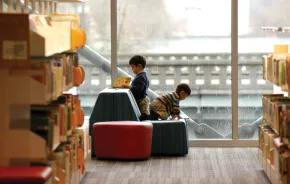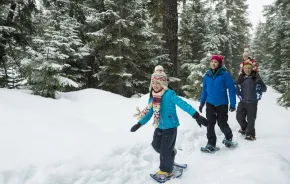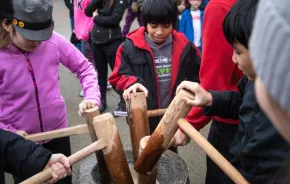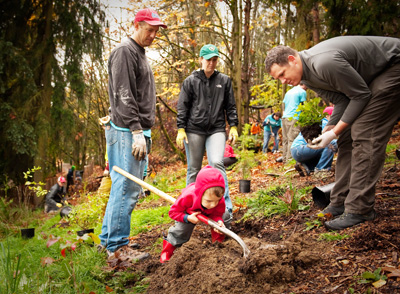 Restore a Park or Beach
Restore a Park or Beach
It’s hard to beat the tangibility of planting trees, doing battle with invasive plants, or cleaning up a beach. Opportunities abound, especially during Earth Month and many organizations have opportunities all year long. Just by participating, you and your kids learn about nature on location, and in some cases, organizations deliberately add a learning component.
EarthCorps, for example, includes reflection as part of its events; and Friends of Cedar River Watershed sometimes combines work parties with a lesson – check out upcoming Earth Day events here.
Find upcoming volunteer opportunities on ParentMap's calendar.
Minimum age range: Dependent on organization. EarthCorps, for example, welcomes children (and babies!) at most events. Tacoma Nature Center notes that its volunteer days are better suited for older children.
Perks: An opportunity to give back to places that families use so much, to learn plant names, and weed-pulling skills that can be applied at home, too!
To be aware: Unless a work party is explicitly open to children, parents should confirm that it’s okay to bring a child and to find out more about the work and terrain.
Great Organizations to Consider:
Friends of Cedar River Watershed
EarthCorps
Green Seattle Partnership
Mountains to Sound Greenway Trust
Nature Consortium
Tacoma Nature Center
Puget Sound Creek Restoration society
People for Puget Sound
Photo credit: EarthCorps
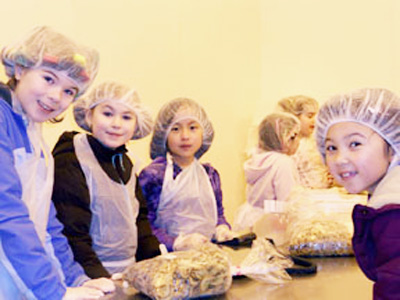 Organize Food for the Hungry
Organize Food for the Hungry
Kids as young as six can work alongside their parents to help organizations like Shoreline-based Food Lifeline and Tacoma-based Food Connection to package large food donations for local food banks and shelters. A number of nonprofits hold regular community work parties and encourage families to attend. At Food Lifeline, online registration is required for volunteering. Heads up: North Helpline has three great fundraisers coming up in April and May.
Minimum age range: Six and up; dependent on organization
Perks: Exposure to issues around food or hunger while doing real work; opportunity to practice social skills, math skills and food-prep skills.
Great Organizations to Consider
Food Lifeline, Shoreline
Emergency Feeding Program, Seattle
St. Mary’s Food Bank, Seattle
Greenwood Food Bank, Seattle
Hopelink Food Banks, several locations
PCC Food Bank Program events
North Helpline Emergency Services and Food Bank, North Seattle
Food Connection, Tacoma
Multi-Service Center Food Bank, several locations
Northwest Harvest, several locations
Jubilee Women's Center, Seattle (for help preparing community meals)
Operation Sack Lunch, Seattle (for help preparing meals for the homeless)
Photo credit: Food Lifeline
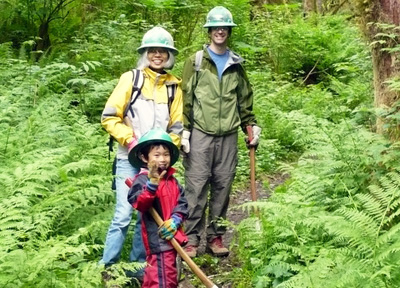 Maintaining Hiking Trails
Maintaining Hiking Trails
If your kids are comfortable with hiking, join a Washington Trails Association (WTA) work party to maintain trails in some of the most beautiful spots around Puget Sound; kids younger than 14 are welcome with an adult. Families are also welcome to sign up for one of WTA’s week-long volunteer vacations.
Minimum age range: No official minimum, though the WTA volunteer coordinator notes that the vacations are geared towards older kids (12 and up). WTA also offers teen work parties and volunteer vacations for ages 14 and up.
Perks: Hiking in places you might not know about, learning about trails and parks issues, and trail camaraderie
Great opportunities to consider:
WTA trail-building parties
WTA volunteer vacations
Photo credit: Washington Trails Association
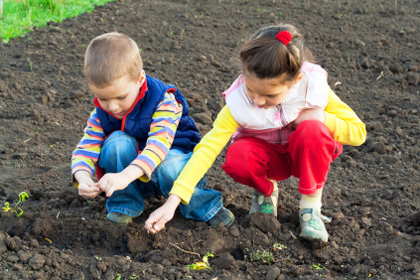 Garden for Your Community
Garden for Your Community
Want to flex your family’s green thumb for a cause? You can help plant, weed, and harvest in community gardens such as the Magnuson Children’s Garden in northeast Seattle, or help grow food for low-income families and seniors at places like the Giving Garden at Marra Farm in south Seattle (run by Solid Ground’s Lettuce Link program). Seattle Tilth also connects gardeners with fun places around Seattle to volunteer, drop-in work parties, and other grassroots organizations, like the Just Garden Project.
Minimum age range: Typically, all ages
Perks: On-the-ground garden lessons from experts and peers; the satisfaction of addressing issues like hunger in a very hands-on way.
Great Organizations to Consider:
Magnuson Children’s Garden, Northeast Seattle
The Giving Garden at Marra Farm, South Park, Seattle
Seattle Tilth , North Seattle
Just Garden Project
Leo’s Garden supplies food for Pierce County’s Food Connection
Plant a Row for the Hungry
Many community gardens around the Sound encourage family volunteering; check your local garden or get in touch with your local sustainable community network.
 Bring Joy to the Elderly
Bring Joy to the Elderly
Call up that local nursing home that you’ve been driving by and see if you can bring the kids for a visit (extra points for babies). If your family plays music together, you can put on a show. You can also sign up to become a regular visitor to seniors who are aging in their home. And if it’s easier to volunteer from home, you can make cards and letters that will bring a smile to seniors.
Minimum age range: All ages
Perks: Time spent with the elders in our society, exposure to issues around aging and death.
Great Organizations to Consider:
Check with senior centers, elderly day-care facilities, nursing homes, and hospitals
NEST, a nonprofit in northeast Seattle, uses volunteers to provide companionship and care to seniors aging in their homes.
Full Life Care has a volunteer companionship program for adults, who can bring children
Senior Angels allows adults to sign up online and send seniors cards – the whole family can help
 Foster a Neglected Animal
Foster a Neglected Animal
Fostering an animal through organizations like PAWS or the Seattle Humane Society can help children learn responsibility, and build empathy and compassion. Foster care typically involves two weeks to three months of temporary care for animal awaiting adoption; foster families pick up their animal from the shelter, transport it to occasional vet appointments, and provide loving care and supplies. Families can also help raise money, donate needed items, or participate in events like the annual PAWSwalk each summer and learn more about pet care.
Minimum age range: Foster parent typically must be 18 or older, but the whole family can help.
Perks: Improving the lives of pets and learning as a family about animal care.
Great Organizations to Consider
PAWS
Seattle Animal Shelter
Humane Society of Tacoma and Pierce Counties
Pasado’s Safe Haven
 Sort Baby Clothes, Toys and other Donations
Sort Baby Clothes, Toys and other Donations
Children who are preschool age and older can practice their sorting skills by helping nonprofits who work on behalf of young children and families organize incoming donations of children’s clothes and material goods.
In some cases, you can even sort and launder donated clothes from home -- a great option for busy families!
Minimum age range: 7, though it can vary
Perks: A tangible way for children to help children, practice motor skills, and involve the whole family.
Great Organizations to Consider:
Seattle Baby Corner
Eastside Baby Corner
WestSide Baby
Treehouse
Toy Rescue Mission, Tacoma
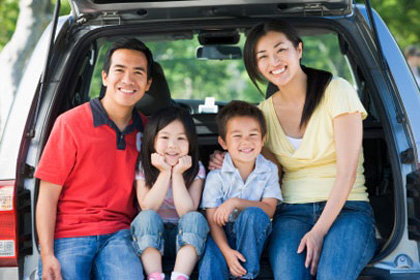 Turn Your Car Into a Do-Good-Mobile
Turn Your Car Into a Do-Good-Mobile
With your kids – aka deputy do-gooders – by your side, you can pick up and deliver donations for many types of organizations. Simple tasks like loading the car and driving to and fro can give an opportunity to discuss what you’re doing and why with your kids. As one mom interviewed for our family volunteering story put it: “It’s amazing what just driving around can do.”
Minimum age range: Since adult is primary volunteer, none.
Perks: Low bar for involvement, good entry point into volunteering.
Great Organizations to Consider:
Chicken Soup Brigade/Care to Shop
Seattle Baby Corner
Eastside Baby Corner
WestSide Baby
Youth Care
The Rescue Mission, Tacoma
The Multi-Service Center
Check your local food bank and other service organizations; many need volunteer drivers
 Organize a Drive
Organize a Drive
As children grow, discarded bikes sit in the garage collecting dust, clothes sit in the basement gathering dust – you get the picture! Your family can recycle for a cause by organizing a bike drive for Seattle Bike Works, for example, which donates bicycles to kids and teaches them to fix bikes and ride safely. Or you could organize a donation drive for foster kids at organizations like Treehouse or Seattle Children’s Hospital. Your kids can make posters and get their schools or teams involved.
Minimum age range: None
Perks: Declutter and be green while doing good!
Great Organizations to Consider:
Seattle Bike Works
Treehouse
Seattle Children’s Hospital
Books for Kids
Many other organizations, of course, need donations -- Donate Seattle has a good list
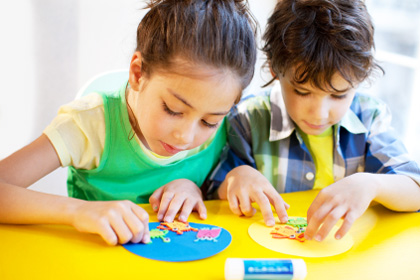 Do it Yourself
Do it Yourself
Who says you have to sign up somewhere – or even leave home -- to make a difference in your community? With your kitchen table designated as your Doing Good HQ, you can write cards to veterans, sick children, or seniors, decorate placemats for Meals on Wheels, make breakfast bags for Ronald McDonald House, or even grow food in your own home garden for a local food bank. Doing good and giving back has never been so easy!
Perks: Another great entry point for volunteering with kids
Helpful Websites:
Doing Good Together is an excellent resource on kitchen-table projects
Generation On has a list of 65 DIY ways to make a difference
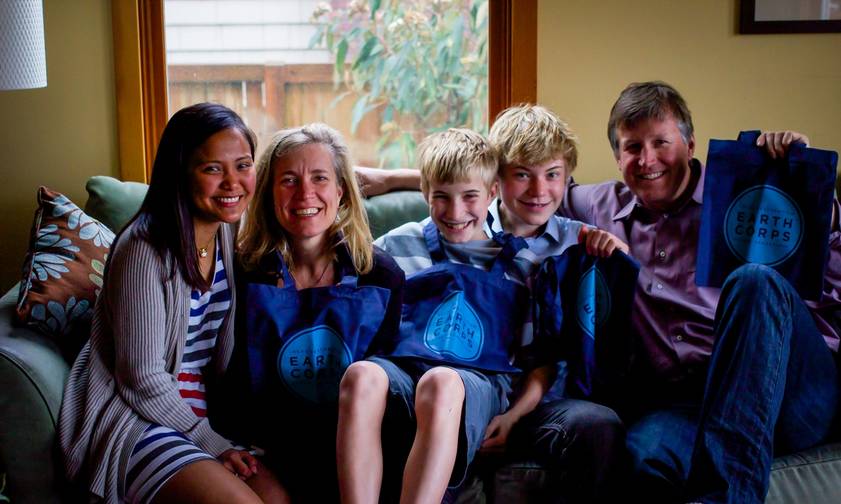 Host a Student from Another Country
Host a Student from Another Country
Interested in increasing your family's CQ (cultural quotient), learning about another country firsthand and making an impact without leaving home?
Consider hosting an international student or volunteer for a "homestay" for anywhere from two weeks to a year, or beyond.
For example, EarthCorps, a Seattle-based nonprofit that trains volunteers (ages 22-26) from more than 80 countries in environmental leadership and restoration, is often looking for homestay families to host volunteers for three and six-month stints.
Other Seattle-area options include FIUTS, a UW Hosting and Friendship program that connects overseas students with local families through short homestays; The World Affairs Council, which looks for dinner hosts and homestay hosts for visitors such as Fulbright Students; and AFS, an international exchange program for high school students that brings in more than 2,300 students from 90 countries annually.
Great organizations to consider:
EarthCorps
FIUTS
AFS
The World Affairs Council
Photo: Pictured is the O'Brien family of Seattle, with Jessa, a Philippine EarthCorps volunteer whom they hosted.
Editor's note: These 11 ideas, of course, are just a starting place. If we missed an organization you'd like to see listed, or have an idea for other opportunities we should cover, write emurray@parentmap.com.






